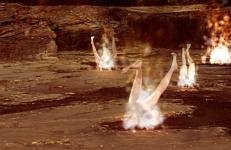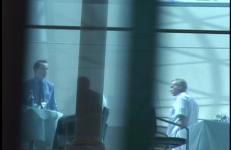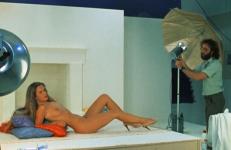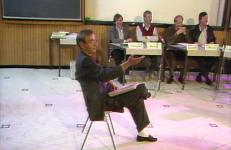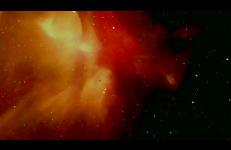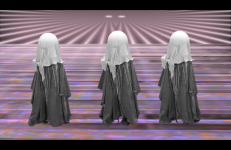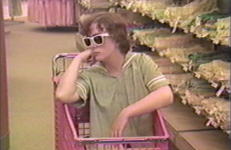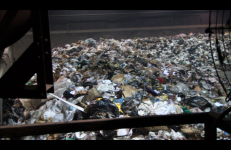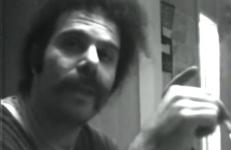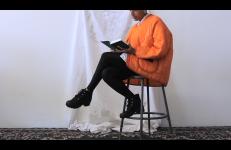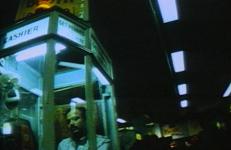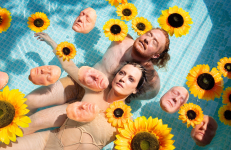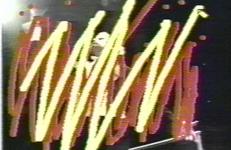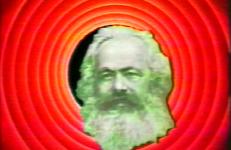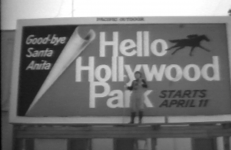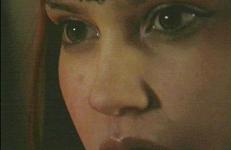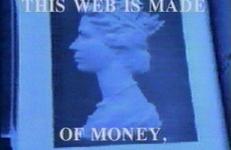Conceptual artist Hans Haacke’s two most notorious works took unsavory Manhattan real-estate dealing as their subject, which triggered the cancellation of his exhibition Real Time Social System at the Guggenheim Museum in 1971. With the conscientiousness of an investigative reporter, Haacke continues to scrutinize the rough edges between art and life.
Consumer culture
Parnes moves further into her interrogation of horror genres and the art world, with their sometimes over-lapping cults of personality. Grappling with the danger of beauty without criticality, Hollywood Inferno takes the viewer through the alienating world of a teenager named Sandy, a modern-day Dante, and follows where her aspirations toward stardom lead her.
How Little We Know of Our Neighbours is an experimental documentary about Britain's Mass Observation Movement and its relationship to contemporary issues regarding surveillance, public self-disclosure, and privacy. At its center is a look at the multiple roles cameras have played in public space, starting in the 1880's, when the introduction of the hand-held camera brought photography out of the studio and into the street. For the first time one could be photographed casually in public without knowledge or consent.
"Four days spent in a studio working on a centerfold photo for Playboy magazine provided the subject matter for my film. The magazine itself deals with culture, cars, a certain lifestyle. Maybe all those trappings are only there to cover up the naked woman. Maybe it's like with a paper-doll. The naked woman in the middle is a sun around which a system revolves: of culture, of business, of living!
This film is about a five-day seminar designed to teach executives to "sell themselves" better. This course, designed for managers, teaches the basic rules of dialectics and rhetoric and provides training in body language, gesture and facial expression. The aim of selling something has always been a principle of mercantile action. Yet it was only through the marriage of psychology and modern capitalism that the idea of selling oneself was perfected.
-- Lutz Hachmeister
A deceased hoarder, reconstituted through technology, recounts a difficult childhood as inhabitants of a virtual world struggle to reconcile materialistic tendencies. A scientist leads an effort to understand the passage of time, but the data is unreliable. The question remains, what happens to our things after we are gone?
Imagining future Deep Time, Post-extinction, using dark humor to speculate on the defiant vitality of matter to evolve life again. Two billion years from now, the oceans are beyond understanding. A soup of plastics, cloth and string, song and dance, collaborate to find new ways of moving in bleak time. The ghost of an oyster holds memories of what happened. It sings to a scrap of waste that fell to the bottom of the sea, trying to form new life, trying to get a face. With help from Stevie Wonder, undersea karaoke may still be possible.
"Noted critic Judith Williamson ventures from her English home to a shopping mall in Southern California to proffer some opinions on the working of American culture under capitalism. Using the exponential increase in the numbers and styles of socks available in the marketplace as a wry point of departure, Williamson shops for socks and questions the dubious need for a specific style of sock for just about any endeavor one could name."
—1987 AFI Video Festival Catalogue
Produced at the San Francisco Art Institute, and featuring a few musical numbers, this jungle drama deals with a commercial corporation infiltrating the Amazon to sell beauty aids to the indigenous peoples. Witch doctor magic and political intrigue run rampant in this hot house environment, and men and women deal with the beast within and without.
A familiar landscape comprised of big box stores and parking lots proves a rich site for longing, intimacy, and radical change. Celebrities are observed in this environment and are reduced to ordinary beings in the process. An enigmatic protagonist reveals little moments of subjectivity that escape into the piece like a contaminant, rupturing the view and evidencing the paradox of connection and belonging within systems that simultaneously contain us and comprise us.
In January 2001, the KEN BURNS’ JAZZ promotional blizzard hit New York City. Billboards, banners on buses, elaborate retail displays in book and record stores, feature coverage in every major print, radio and TV outlet, chatter around the water cooler at the office — total saturation.
The interior of a trash processing plant. The rhythmic intensity of the machinery as it deals with an endless river of refuse becomes a reflection on the madness of unbridled consumption.
Music by Sebastian Currier. Produced at Voom HD Lab.
Timely concerns about the future of video, artists’ complicity in the money making system of the ‘establishment,’ and the effect of the camera’s presence on personal encounters, is discussed and debated in this late night video produced by David Cort, Chuck Kennedy, and Skip Blumberg.
Sections 1-30 of an incomplete extended poem describing the artist's connection to the radical black tradition. The completed poem will be formed of 180 sections.
"Lessons are all about constraints; they are thirty seconds, must feature a black figure, and I have rules about where to make cuts, how to edit sound, etc."
— Martine Syms in conversation with Aram Moshayedi, Mousse Magazine
Sections 31-60 of an incomplete extended poem describing the artist's connection to the radical black tradition. The completed poem will be formed of 180 sections.
"Lessons are all about constraints; they are thirty seconds, must feature a black figure, and I have rules about where to make cuts, how to edit sound, etc."
— Martine Syms in conversation with Aram Moshayedi, Mousse Magazine
The result of over five years of Super-8 and 16mm filming on New York City streets, Lost Book Found melds documentary and narrative into a complex meditation on city life. The piece revolves around a mysterious notebook filled with obsessive listings of places, objects, and incidents. These listings serve as the key to a hidden city: a city of unconsidered geographies and layered artifacts—the relics of low-level capitalism and the debris of countless forgotten narratives. The project stems from the filmmaker's first job in New York—working as a pushcart vendor on Canal Street.
Magic Thinking is a multi-platform film installation steeped in the current moment when climate catastrophe, the COVID pandemic, and the rise of fundamentalism combine to contribute to an apocalyptic aura. With this aura, magical thinking can become a survival strategy, creating surprising bedfellows. In particular, the confluence of far-right extremism and the “wellness” world.
Colorful lines follow the gestures of a conductor leading the orchestra until he disappears just at the point of crescendo. As the music slows, he starts to reappear. A sketch as a tribute to Walt Disney.
This title is also available on Ximena Cuevas: El Mundo del Silencio (The Silent World) and Half-Lies: The Videoworks of Ximena Cuevas.
Displaying a broad range of Golden Age Hollywood animation, Manifestoon is an homage to the latent subversiveness of cartoons. Though U.S. cartoons are usually thought of as conveyors of capitalist ideologies of consumerism and individualism, Drew observes: "Somehow as an avid childhood fan of cartoons, these ideas were secondary to a more important lesson—that of the 'trickster' nature of many characters as they mocked, outwitted and defeated their more powerful adversaries.
Originally presented as a live performance piece using actors, multiple monitors, and music, Modern Times is a consolidation of seven short chapters in the life of a modern woman. In the first sequence, the objects in a suburban home are inventoried: "nice couch," "nice car," and so on — ending with the titles "nice concept," "nice image" — and unmasking this materialistic world as an impossible consumer fantasy. In the next scene, an attractive man sunbathes.
Looking like a 1970’s version of “Rosie the Riveter”, Mogul takes on the persona of an artist who makes a living posting billboards on the Sunset Strip in Hollywood. As Mogul recounts her climb up the billboard “ladder”, she realizes that the only way to truly make a “name” for herself is to create her own billboard. And so she does.
Taped on Prince Street in Soho, New York City, Skip Blumberg creates a one-word performance. Shouting the word "money" over and over, he attracts the attention of New York's finest. The video crew attempt to explain to the policemen that there is no public disorder as the streets were empty when they began to tape.
The video is an unwitting early example of the reaction of the state to the use of video cameras on the streets.
A combination of experimental and narrative approaches which explore the commodification of rebellion as it is marketed to youth culture, through the eyes of two drug-dealing, teenage girls from Brooklyn who "accidentally" kill and mutilate their favorite alternative rock star. Their obsession with murders and makeovers and their confusion between fashion and transgression lead these girls into a world where nihilism is bought and sold, and rebellion is impossible.
Using a pulsing rock soundtrack and music video-style editing, X-PRZ combines archival footage of Malcolm X, advertisements, and corporate logos in No Sell Out to provide a scathing commentary on commodity culture.
Using a pulsing rock soundtrack and music video-style editing, X-PRZ combines archival footage of Malcolm X, advertisements, and corporate logos in No Sell Out to provide a scathing commentary on commodity culture.





